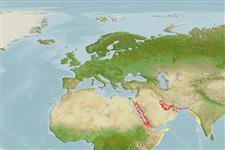Common names from other countries
Environment: milieu / climate zone / depth range / distribution range
Ekologi
marina revassocierade; djupintervall 3 - 20 m (Ref. 9710). Tropical
Western Indian Ocean: Red Sea and Gulf of Aden.
Size / Vikt / Age
Maturity: Lm ? range ? - ? cm
Max length : 23.0 cm TL hane/ej könsbestämd; (Ref. 9710); common length : 15.0 cm TL hane/ej könsbestämd; (Ref. 5450)
A common species (Ref. 9710) found in areas where there is rich coral growth. Often seen in pairs or small aggregations. Occasionally observed hovering in a stationary position for extended periods under ledges of Acropora plate corals (Ref. 4858). Oviparous (Ref. 205). Form pairs during breeding (Ref. 205).
Life cycle and mating behavior
Könsmognad | Reproduktion | Lek | Ägg | Fecundity | Larver
Form pairs during breeding (Ref. 205).
Robins, C.R., R.M. Bailey, C.E. Bond, J.R. Brooker, E.A. Lachner, R.N. Lea and W.B. Scott, 1991. World fishes important to North Americans. Exclusive of species from the continental waters of the United States and Canada. Am. Fish. Soc. Spec. Publ. (21):243 p. (Ref. 4537)
IUCN Red List Status (Ref. 130435)
CITES (Ref. 128078)
Not Evaluated
Threat to humans
Harmless
Human uses
Akvarium: Kommersiell
Ytterligare information
referenserVattenbrukVattenbruksprofilAvelslinjerGenetikElectrophoresesÄrftlighetSjukdomarBehandlingMass conversion
Verktyg
Special reports
Download XML
Internet-källor
Estimates based on models
Preferred temperature (Ref.
115969): 24.7 - 29.3, mean 27.3 (based on 154 cells).
Phylogenetic diversity index (Ref.
82804): PD
50 = 0.5000 [Uniqueness, from 0.5 = low to 2.0 = high].
Bayesian length-weight: a=0.02291 (0.01133 - 0.04632), b=3.00 (2.83 - 3.17), in cm Total Length, based on LWR estimates for this Genus-body shape (Ref.
93245).
Trofisk nivå (Ref.
69278): 3.5 ±0.37 se; based on food items.
Resiliens (Ref.
120179): Hög, lägsta populationsfördubblingstid mindre än 15 månader (Preliminary K or Fecundity.).
Fishing Vulnerability (Ref.
59153): Low vulnerability (17 of 100).
